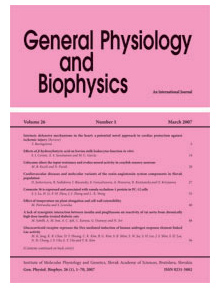Journal info
Aims and Scope |
||
Select Journal
Journals
Bratislava Medical Journal Endocrine Regulations General Physiology and Biophysics 2024 2023 2022 2021 2020 2019 2018 2017 2016 2015 2014 2013 2012 2011 2010 2009 2008 2007 Neoplasma Acta Virologica Studia Psychologica Cardiology Letters Psychológia a patopsych. dieťaťa Kovove Materialy-Metallic Materials Slovenská hudbaWebshop Cart
Your Cart is currently empty.
Info: Your browser does not accept cookies. To put products into your cart and purchase them you need to enable cookies.
General Physiology and Biophysics Vol.31, No.2, p.179–184, 2012 |
||
| Title: Effect of normobaric oxygen treatment on oxidative stress and enzyme activities in guinea pig heart | ||
| Author: Zuzana Tatarkova, Ivan Engler, Andrea Calkovska, Daniela Mokra, Anna Drgova, Stanislav Kuka, Peter Racay, Jan Lehotsky, Dusan Dobrota, Peter Kaplan | ||
| Abstract: Abstract. Normobaric oxygen (NBO) therapy is commonly applied for the treatment of various diseases, including myocardial infarctions, but its effectiveness is controversial. Potential adverse effects of hyperoxia are related to excessive formation of free radicals. In the present study we examined the effect of 60-h NBO treatment on lipid peroxidation (LPO), activity of manganese superoxide dismutase (Mn-SOD) and mitochondrial enzymes of energy metabolism in guinea pig heart. NBO treatment resulted in significant accumulation of thiobarbituric acid reactive substances and loss of Mn-SOD activity despite slight elevation of Mn-SOD protein content. Activity of electron transport chain complex III decreased significantly, while activity of complex IV was slightly elevated and citrate synthase was unchanged. LPO, inhibition of Mn-SOD and complex III activities were more pronounced when inhaled oxygen was partially enriched with superoxide radical. In contrast, when O2 was enriched with oxygen cation (O2•+), LPO and loss of Mn-SOD activity were prevented. Complex III activity in the O2•+-treated group remained depressed but activities of complex IV and citrate synthase were elevated. These data suggest that NBO treatment is associated with myocardial oxidative damage and attenuation of antioxidant defense, but these adverse effects can be partially attenuated by inhalation of O2 enriched with oxygen cation. |
||
| Keywords: Normobaric oxygen — Heart — Mitochondria — ROS — Oxidative stress | ||
| Year: 2012, Volume: 31, Issue: 2 | Page From: 179, Page To: 184 | |
| doi:10.4149/gpb_2012_020 |
||
|
|
 download file download file |
|

